News from Maison de la Gare
Into the Bush, in Search of an Education
Tweeter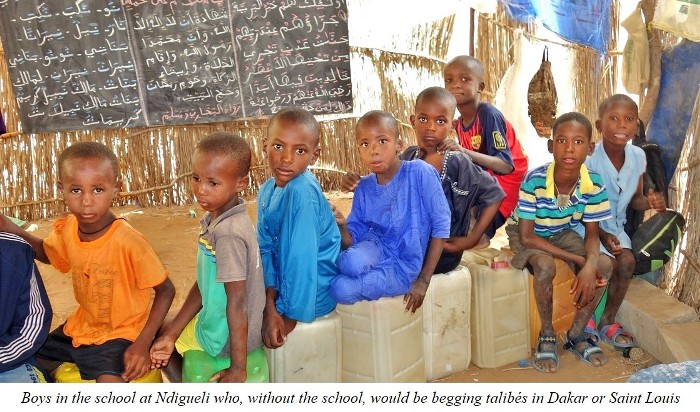
Cheikh Diallo’s vision lights a new path for village children at risk of becoming talibés (as told by Sonia LeRoy and Rod LeRoy)
For many years, we have known a local
cobbler in Saint Louis who has become a friend and an inspiration. Cheikh Diallo, in
turn, claims that we have inspired him. As he learned of and watched our work as
volunteers and partners with Maison de la Gare, he began to
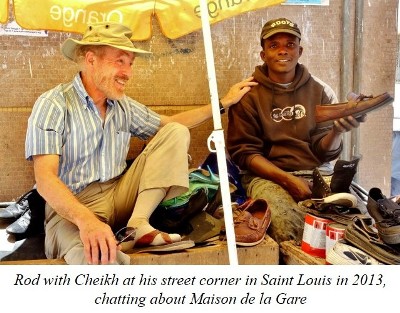 save his earnings toward
building a primary school and supporting teachers in his home village in the region of
Mbaye Aw. After many discussions (while repairing shoes) about how education can
provide hope, and change everything for a child such as a forced begging talibé,
Cheikh had become a believer.
save his earnings toward
building a primary school and supporting teachers in his home village in the region of
Mbaye Aw. After many discussions (while repairing shoes) about how education can
provide hope, and change everything for a child such as a forced begging talibé,
Cheikh had become a believer.
His idea is simple. If education is accessible locally, families will not be tempted
to send their boys to cities to become talibés. Impressed with Cheikh's dedication to
providing opportunity, we contributed regularly to his dream and, eventually, the first
school was built.
When the ongoing challenge of funding teachers proved beyond
Cheikh's means, we introduced him to Issa Kouyaté to ally this unique project with
Maison de la Gare. Cheikh invited us to visit Mbaye Aw to see the project ourselves,
an invitation that we accepted enthusiastically.
We left Saint Louis for the district of Mbaye Aw at 9 a.m. However, it soon became
clear that we should have left much earlier. One hour down the-well paved highway to
Louga, then a left turn inland to the town of Dahra Djoloff, over 100 km on a very
badly potholed road. 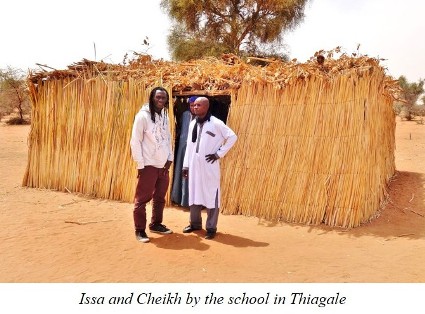 Although we drove carefully so as not to join the other flat-tired
vehicles along our route, the hours surely amounted to far more distance than was
estimated. Along the way were herds of dromedaries and as many donkeys and goats as
holes in the road.
Although we drove carefully so as not to join the other flat-tired
vehicles along our route, the hours surely amounted to far more distance than was
estimated. Along the way were herds of dromedaries and as many donkeys and goats as
holes in the road.
Not long after Darha Djoloff, the "paved" road ended. And, not too long after that, we
cut off the main road onto a dirt track leading through the sandy scrub. This part of
the country is referred to as the bush. The first school we arrived at was in the
village of Ndigueli. 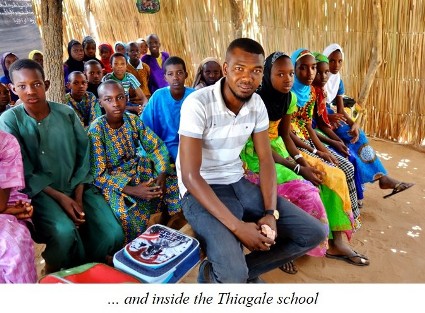 It had 28 students, including 4 girls. Girls marry as young as
12 or 13 here, so it is rare for parents to educate them. Cheikh and his
collaborators are making a major effort to convince parents to send their girls to
school, and to help to obtain birth certificates so these kids can get national
identity cards and thus, someday, have the option of continuing past primary school;
this is not possible without papers.
It had 28 students, including 4 girls. Girls marry as young as
12 or 13 here, so it is rare for parents to educate them. Cheikh and his
collaborators are making a major effort to convince parents to send their girls to
school, and to help to obtain birth certificates so these kids can get national
identity cards and thus, someday, have the option of continuing past primary school;
this is not possible without papers.
About an hour past Ndigueli we came to a water well. This well serves an area of many
square kilometers. Most villages do not have their own water source, so the women walk or
drive donkey carts for great distances to collect water for their villages. Two women
at the well were collecting water in traditional containers ... old inner tubes ...
with babies strapped to their backs; they had travelled six kilometers to get
to the well. Collecting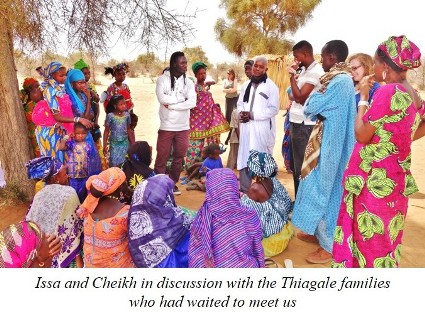 water can be nearly a full-time job for the women of villages
in the bush.
water can be nearly a full-time job for the women of villages
in the bush.
Kids were still in class at the second school we visited, at the village of Thiagale.
Like the first school in Ndigueli, the building was constructed of cut wooden poles
and straw walls. These buildings apparently suffer significant damage during the
rainy season and are then repaired or rebuilt. Or not, depending on the means of the
villagers at the time. At this school a welcoming committee of all the village
mothers awaited us. We were a tremendous curiosity to this very isolated community.
Of the 31 students in this school, 12 are girls. And only one child in the school
has papers. Many of the students in the school walk for hours to get here. They
know education is important, possibly their only hope for something better.
Life in these remote villages is hard. Food is more abundant
after the rainy season but, at this time of
the year at the 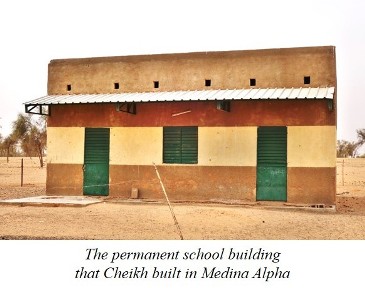 start of the summer, it is much scarcer. The distance to travel to obtain water contributes to
life's many challenges here. When there is no education available, what else is
there but to marry young, start a family and continue the cycle. Many boys are sent
to daaras in the cities to be talibés, although this practice is diminishing thanks
to the schools that Cheikh has founded. Cheikh explained that education will help
these kids to expect and to actively seek better for themselves. Education will
encourage change to happen here.
start of the summer, it is much scarcer. The distance to travel to obtain water contributes to
life's many challenges here. When there is no education available, what else is
there but to marry young, start a family and continue the cycle. Many boys are sent
to daaras in the cities to be talibés, although this practice is diminishing thanks
to the schools that Cheikh has founded. Cheikh explained that education will help
these kids to expect and to actively seek better for themselves. Education will
encourage change to happen here.
Another half hour journey and a few wrong turns later we arrived at the village of
Medina Alpha. There are 5 boys and 23 girls at this school. This is the first of the
four schools to be constructed as a solid-walled building that can withstand
the elements, and the leaders and parents of this village have embraced the hope
offered by education. It is run as a modern school and all
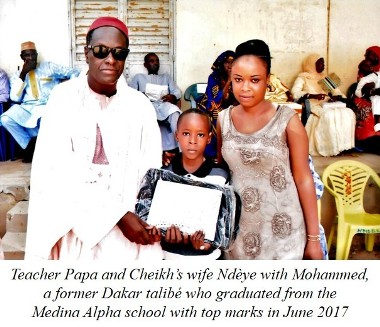 classes are taught in
French. All the children here have papers. Cheikh and the teachers are working to
identify and bring home the boys from this village from the cities where they have
been sent to be begging talibés, a realistic hope now that true education is
available locally. Many boys have come home.
classes are taught in
French. All the children here have papers. Cheikh and the teachers are working to
identify and bring home the boys from this village from the cities where they have
been sent to be begging talibés, a realistic hope now that true education is
available locally. Many boys have come home.
The last school site we visited, at Belel Ndioba, sadly no longer exists. A straw-walled
school like two of the others, it was soon dismantled when the teacher left;
it did not take long for the abandoned building to be reclaimed by the elements and
needy neighbors. This school required a fee of about $3 per month per child and,
when a critical mass of parents could no longer pay, the teacher stopped coming.
43 children have had their education suspended, 19 girls and 24 boys. The villagers
here hold out hope that Maison de la Gare can make something happen
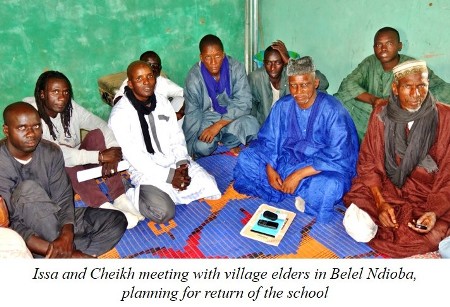 for their children.
for their children.
We finished the tour with a visit to our friend Cheikh’s home village, Wouro Seno. As
usual, there is no water source here and the women walk two kilometers each way daily
to collect water. By the time we had finished a feast in honor of our visit and had met
all Cheikh's family, we knew we would not make it back to Saint Louis before dark. But,
we did reach the "paved" road just before the sun set.
As we climbed out of the vehicle after 10 p.m., we all reflected on our own good fortune
to have such ready access to water and the other necessities of life and, above all, to
education and thus to opportunity. And we marveled at Cheikh’s courage and vision in
giving everything he has to make possible a promising future for the boys and girls of
his village and others like it.
_________________
p.s. There is an incredible human aspect of this story that we must share with you.
When Cheikh told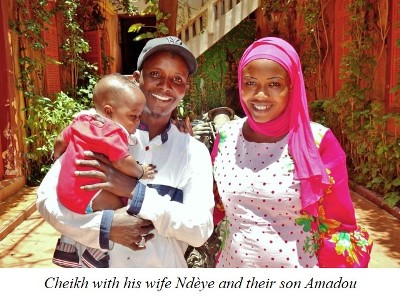 the village chief of Medina Alpha of his vision to build the school,
the chief was completely supportive. In fact he said that, if the school were really
built, he would give his daughter Ndèye to Cheikh in marriage. The school was built,
graduating its first students in 2017, and Cheikh and Ndèye were married that same year.
They are very happy, and their son Amadou was born in January of this year.
the village chief of Medina Alpha of his vision to build the school,
the chief was completely supportive. In fact he said that, if the school were really
built, he would give his daughter Ndèye to Cheikh in marriage. The school was built,
graduating its first students in 2017, and Cheikh and Ndèye were married that same year.
They are very happy, and their son Amadou was born in January of this year.









